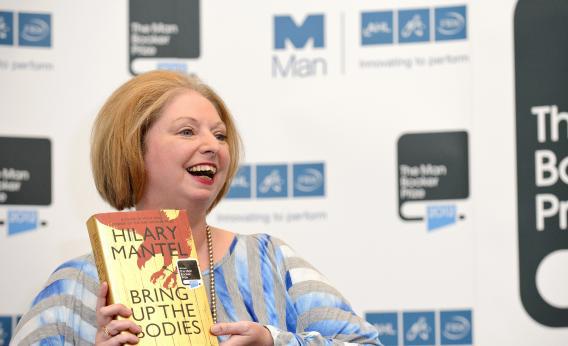Yesterday, the British author Hilary Mantel won her second Man Booker prize for Bring Up the Bodies, the second novel in her planned trilogy about Thomas Cromwell, the son of a blacksmith from Putney who rose to become the most important minister to Henry VIII, and helped facilitate both the king’s divorce from Catherine of Aragon and the declaration of independence by the Church of England. Mantel is the first woman to win twice: Mantel also won the Booker for Wolf Hall, the first book in the trilogy, in 2009. This is quite an accomplishment, one that Mantel achieved by writing two books about men.
That’s not to diminish the work. Mantel has summoned to life Thomas Cromwell, Henry VIII, Thomas More, Cardinal Thomas Wolsey, and many others before dispatching them to luminous visions of their historical deaths. Wolf Hall and Bring Up the Bodies are, in fact, two of my favorite recent books about what it means to be a man.
Cromwell, an emerging model of a self-made and socially-mobile man, rolls over the noblemen, clergymen, and ambassadors who stand in his path and his king’s. “He can draft a contract, train a falcon, draw a map, stop a street fight, furnish a house and fix a jury. He will quote you a nice point in the old authors, from Plato to Plautus and back again. He knows new poetry, and can say it in Italian. He works all hours, first up and last to bed. He makes money and he spends it. He will take a bet on anything,” Mantel wrote in Wolf Hall, offering a very different definition of desirable masculinity from the excess and kingly whims that defined Henry’s court before Cromwell arrived.”You are a man of the world, Master Secretary,” a noblewoman tells Cromwell in Bring Up the Bodies, “and you know that if you yourself wrote a woman a poem you would enclose a bill.”
The women in Mantel’s novels spring off the page, too, whether in Catherine’s pious, legalistic insistence that no force in the world can unmake her Henry’s wife, in the sharp, darting intellect of Henry’s second wife Anne Boleyn, or in the sensual uncertainty of Anne’s sister, Mary. But they are locked out of the halls of power, relying on men as their go-betweens and advocates, turned aside as Henry’s appetites shift, first to Anne, and then Jane Seymour. Wolf Hall and Bring Up the Bodies are fundamentally stories about how men manage women whose intellects and desires are mostly regarded as inconvenient.
And Mantel does such an excellent job conjuring those men and those dynamics that I admit I’m a little jealous. I would love to see her formidable talent used toward recreating the perspectives of the women in Henry and Cromwell’s orbits, a task that’s been dominated by more popular, less literary, authors like Philippa Gregory. And I wish the Booker Prize would deem more stories about women’s lives as great literature.
Of the last 10 Booker prizes, just two have gone to books that have women as their sole or shared main characters: Anne Enright’s The Gathering and Kiran Desai’s The Inheritance of Loss. It would be nice to see more Booker-caliber female and male authors delve into the lives and brains of women, and to see the judges that decide what counts as leading literary fiction acknowledge more often that a woman’s can be as grand a tapestry as a man’s—and that domestic narratives are as worthy as chronicles of state.
